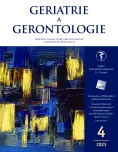Differenciation of palliative care phases of nursing home clients – introduction of a new questionnaire
Authors:
Hrnčiariková Dana 1; Lorencová Ludmila 2; Bašková Markéta 2; Andrejsová Dana 2
Authors‘ workplace:
II. interní gerontometabolická klinika, Lékařská fakulta v Hradci Králové, Univerzita Karlova, Fakultní nemocnice Hradec Králové
1; Domov důchodců, Dvůr Králové nad Labem
2
Published in:
Geriatrie a Gerontologie 2023, 12, č. 4: 177-181
Category:
Overview
The ability to provide palliative care in nursing homes plays an important role, although not all clients require it. We searched for a tool that would help identify clients who would benefit from the palliative care provided. We created a questionnaire distinguishing the phases of palliative care, adapted to nursing home clients. As a pilot project, we tested the questionnaire in Dvur Kralove nursing home.
Results: Using the questionnaire, we distinguished 8 clients in the 3rd phase (9.84 %), 19 clients in the 2nd phase (22.89 %), 56 clients (67.47 %) in the 1st phase or frail. Only 30 clients (36.15 %) of all had a serious chronic progressive disease. 3 clients in the 3rd phase (37.5 %) and 2 clients (10.5 %) in the 2nd phase of palliative care died in the first 3 months. After 1 year, a total of 4 clients (50 %) in the group in the 3rd phase of palliative care, 9 clients (47.4 %) in the group in the 2nd phase and 5 clients (8.9 %) in the group in the 1st phase of palliative care died.
Conclusions: Differentiation of palliative care phases has key role in approach to nursing home clients. The questionnaire is filled out for the first time when the client is admitted to the nursing home and further after 6 months or in the event of a change in health status. When the client moves to a higher phase, the multidisciplinary team in the nursing home is informed and the client‘s individual plan is re-evaluated.
Sources
1. https://www.czso.cz/csu/czso/seniori-v-cr-v-datech-2021.
2. https://www.uzis.cz/res/f/008370/demozem2020.pdf.
3. World Health Organization. Dostupné z: https://www.who.int/news-room/fact-sheets/detail/palliative-care.
4. Skála B, Sláma O, Vorlíček J, et al. Paliativní péče o pacienty v terminálním stádiu nemoci. Doporučený diagnostický a léčebný postup pro všeobecné praktické lékaře. Společnost všeobecného lékařství ČLS JEP.
5. Kabelka L. Principy neonkologické paliativní péče – pohled geriatra. Paliat Med Liec Boles 2008; 1(2): 67–70.
6. Sláma O, Kabelka L, et al. Paliativní medicína pro praxi. Praha: Galén 2022.
Labels
Geriatrics General practitioner for adults Orthopaedic prostheticsArticle was published in
Geriatrics and Gerontology

2023 Issue 4
- Advances in the Treatment of Myasthenia Gravis on the Horizon
- Memantine in Dementia Therapy – Current Findings and Possible Future Applications
- Memantine Eases Daily Life for Patients and Caregivers
- Possibilities of Using Metamizole in the Treatment of Acute Primary Headaches
- Metamizole at a Glance and in Practice – Effective Non-Opioid Analgesic for All Ages
-
All articles in this issue
- Editorial
- Gerontological prevention as part of geriatrics
- The role of the doctor in cases of domestic violence against the elderly
- Hearing loss – with an emphasis on presbyacusis and its solution
- Current treatment options for age-related macular degeneration
- Differenciation of palliative care phases of nursing home clients – introduction of a new questionnaire
- The influence of selected factors on the attributed dignity of hospitalized elderly
- Ethanol ablation for giant thyroid cysts and parathyroid adenomas as an alternative to surgery in the elderly
- Myasthenia gravis in a geriatric patient
- News
- Geriatrics and Gerontology
- Journal archive
- Current issue
- About the journal
Most read in this issue
- Gerontological prevention as part of geriatrics
- News
- Hearing loss – with an emphasis on presbyacusis and its solution
- Differenciation of palliative care phases of nursing home clients – introduction of a new questionnaire
